流行病学英文总结
流行病学专业英语词汇
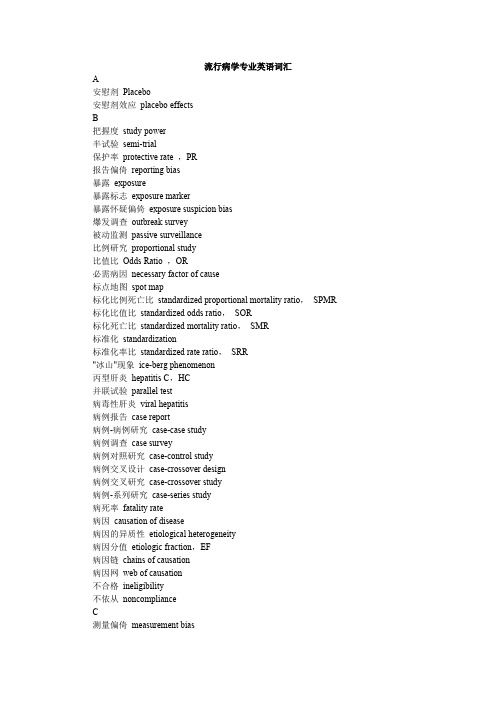
流行病学专业英语词汇 A 安慰剂Placebo 安慰剂效应placebo effects B 把握度study power 半试验semi-trial 保护率protective rate ,PR 报告偏倚reporting bias 暴露exposure 暴露标志exposure marker 暴露怀疑偏倚exposure suspicion bias 爆发调查outbreak survey 被动监测passive surveillance 比例研究proportional study 比值比Odds Ratio ,OR 必需病因necessary factor of cause 标点地图spot map 标化比例死亡比standardized proportional mortality ratio,SPMR 标化比值比standardized odds ratio,SOR 标化死亡比standardized mortality ratio,SMR 标准化standardization 标准化率比standardized rate ratio,SRR "冰山"现象ice-berg phenomenon 丙型肝炎hepatitis C,HC 并联试验parallel test 病毒性肝炎viral hepatitis 病例报告case report 病例-病例研究case-case study 病例调查case survey 病例对照研究case-control study 病例交叉设计case-crossover design 病例交叉研究case-crossover study 病例-系列研究case-series study 病死率fatality rate 病因causation of disease 病因的异质性etiological heterogeneity 病因分值etiologic fraction,EF 病因链chains of causation 病因网web of causation 不合格ineligibility 不依从noncompliance C 测量偏倚measurement bias 长期变异secular change,trend variation 超额死亡率excess mortality 超额危险度excess risk 巢式病例对照研究nested case-control study 成本效果分析cost -effectiveness analysis 成本效益分析cost-benefit analysis 成本效用分析cost-utility 成组匹配category matching 抽样调查sampling survey 抽样框架sampling frame 抽样误差sampling error 出生队列birth cohort 出生队列分析法birth cohort analysis 初级卫生保健primary health care ,PHC 传播概率transmission probability 传播机制mechanism of transmission 传播途径path of transmission 传播途径transmission route 传播因素transmitting factor 传染病communicable diseases 传染过程infectious process 传染性infectiousness 串联试验serial test 粗死亡率crude death rate改成crude mortality rate 较好 粗一致性crude agreement 促成病因contributory factor of cause 错分偏倚misclassification bias 错误分类misclassification D 大骨节病Kashin-Beck disease 大流行pandemic 代表性representativeness 单倍型haplotype 单纯随机抽样simple random sampling 单盲single blind 单项筛检single screening 等位基因allele 等位基因频率gene frequency 地方病endemic diseases 地方病学Endemiology 地方性endemicity 地方性氟中毒endemic fluorosis 地方性砷中毒endemic arsenism 点突变point mutation 点源流行point source epidemic 碘缺乏病iodine deficiency disease 调查随访研究survey follow-up study 调整一致性adjusted agreement 丁型肝炎hepatitis D,HD 动态人群dynamic population 毒力virulence 短期波动irregular variation,rapid fluctuation 队列cohort 队列研究cohort study 对象报告偏倚report bias 多归因程序的方法Multiple imputation procedure 多国心血管病趋势和决定因素监测 Multinational Monitoring of Trends and Determinants inardiovascular Diseases,MONICA 多级抽样multistage sampling 多群组比较研究multi-group comparison study 多态性polymorphism 多项筛检multiple screening E 恶性肿瘤流行病学cancer Epidemiology 二代侵袭率,续发率secondary attack rate,SAR 二级预防secondary prevention F 发病率incidence rate,morbidity 发病密度incidence density 发病密度incidence density 发生率研究incidence study 飞沫droplet 飞沫核droplet nuclei 非即时性non-concurrent 非均衡性错分differential misclassification 非连续性状Discrete traits 肺炎与流感死亡率pneumonia and influenza deaths,即P&I deaths 分层stratification 分层抽样stratified sampling 分层随机分组stratified randomization 分类变量categorical variable 分离分析segregation analysis 分子流行病学Molecular Epidemiology 封闭性抗体blocking antibodies 氟斑牙dental fluorosis 氟骨症skeletal fluorosis 负混杂negative confounding 复等位基因位点multiple alles 复杂性状complex trait G 概念框架conceptual framework 干预随访研究intervention follow-up study 感染储主reservoir of infection 感染来源source of infection 感染力infectivity 感染谱spectrum of infection 感染梯度gradient of infection 感染性腹泻infectious diarrhea 感染性腹泻病infectious diarrheal disease 感染症infections or infectious diseases 高危人群策略high risk strategy 个案case 个案调查case study 个案调查individual survey 个体匹配individual matching 工程干预engineering intervention 共变法method of concomitant variation 共显性codominance 构成比proportion 固定队列fixed cohort 故意伤害intentional injuries 关联的合理性plausibility of association 关联的可重复性consistency of association 关联的强度strength of association 关联的时间性temporality of association 关联的特异性specificity of association 关联的一致性coherence of association 观察偏倚observational bias 观察性研究observational study 观察一致率observation agreement 广义遗传度broad heritability 归因危险度attributable risk 归因危险度百分比attributable risk percent,ARP,或AR% 国际病毒分类委员会International Committee on Taxonomy of Viruses,ICTV 国际冠心病预防工作组 The International Task Force for Prevention of Coronary Heart Disease 国际疾病分类第十版International Classification of Diseases,ICD-10 国家结核病防治项目National Tuberculosis Program,NTP 国家卫生统计中心the National Center for Health Statistics,NCHS H 合作率cooperation rate 核心家系Nuclear families 横断面研究cross sectional analysis 横断面研究cross-sectional study 患病率prevalence rate 回顾性研究retrospective studies 回忆偏倚recall bias 混合型流行mixed epidemic 混合研究mixed study 混杂confounding 混杂偏倚confounding bias 混杂因素confounder,confounding factor 活跃病区active endemic area 获得性免疫缺陷综合症acquired immunodeficiency syndrome,AIDS 霍桑效应Howthorne effect J 机遇chance 基本繁殖率basic reproduction rate 基本繁殖数basic reproductive number,R0 基本人群base population or population at risk 基线信息baseline information 基因gene 基因毒性genotoxic 基因型Genotyping 基因型频率genotype frequency 及时性timeliness 疾病爆发disease outbreak 疾病标志Markers of disease 疾病的分布distribution of disease 疾病的自然史natural history of disease 疾病监测surveillance of disease 疾病链the disease chain 剂量反应关系dose-response relationship 季节性seasonal variation,seasonality 继发关联secondary association 家庭簇研究family cluster study 家庭聚集性Familial aggregation 家庭聚集性研究familial aggregation study 家庭相似性Family resemblance 家系研究pedigree study 甲型肝炎hepatitis A,HA 假阳性率false positive rate 假阴性率false negative rate 间接传播indirect transmission 间接关联indirect association 间接接触indirect contact 检出症侯偏倚detection signal bias 简单随机分组simple randomization 简明损伤定级法abbreviated injury scale,AIS 健康促进health promotion 健康工作者效应healthy worker effect 健康监测系统health information system,HIS 健康生命损失年years of life lived with disability,YLLD 教育干预educational intervention 结局outcome 结局变量outcome variable 截断点cutoff 金标准gold standard 经济干预economic intervention 经节肢动物媒介vector-borne 经空气air-borne 经食物food-borne 经饮水drinking water-borne 经载体vehicle-borne 精确性precision 聚合酶链式反应polymerase chain reaction,PCR 均衡性错分non-differential misclassification 均数回归趋势regression to the mean K 抗原漂移antigenic drift 抗原转变antigenic shift 克山病Keshan disease 空间、时间集研究space-time cluster study 扩大免疫计划expanded program on immunization,EPI L 来源同一identity by descent,IBD 类试验,准试验quasi-trial,quasi-experiment 类推法method of analogy 累积发病率cumulative incidence 罹患率attack rate 礼貌偏倚politeness bias 理论流行病学theoretical epidemiology 历史性historical 连锁linkage 连锁不平衡linkage disequilibrium 连锁分析Linkage analysis 连锁平衡linkage equilibrium 联合无应答偏倚combined nonrespondent bias 联系率contact rate 临床试验clinical trial 灵敏度sensitivity 领先时间偏倚lead time bias 流感病毒influenza virus 流行epidemic 流行病模型epidemic model 流行病学epidemiology 流行病学监测epidemiological surveillance 流行病学实验epidemiological experiment 流行过程epidemic process 流行曲线epidemic curve 流行性出血热epidemic hemorrhagic fever,EHF 流行性感冒Influenza 流行性肾病nephropathia epidemica,NE 率rate 率比rate ratio 率差rate difference,RD 轮状模式wheel mode M 蔓延流行propagated or progressive epidemic 盲法blindness 美国国家胆固醇教育规划National Cholesterol Education Program,NCEP 描述流行病学descriptive epidemiology 描述性研究descriptive study 目标人群target population N 内暴露剂量Internal Dose 内部有效性internal validity 内剂量internal dose 内剂量的测定internal dose meters 纳入/排除偏倚inclusion/exclusion bias 奈曼偏倚Neyman bias P 排除exclusions 排除法method of exclusion 排除偏倚exclusive bias 配对pair matching "皮鞋"流行病学shoeleather epidemiology 匹配matching 匹配变量matching variable 匹配过头overmatching 匹配因素matching factors 偏倚bias 频数匹配frequency matching 普查census Q 前瞻性prospective 8 前瞻性研究prospective study 潜伏期incubation period 潜隐期latent period 潜在工作损失年数Working Years of Potential Life Lost,WYPLL 潜在价值损失年数Valued Years of Potential Life Lost,VYPLL 潜在寿命损失年potential years of life lost,PYLL 强制干预enforcement intervention 求同法method of agreement 求异法method of difference 全人群策略population strategy 缺课天数days lost from school 缺勤天数days lost from work 缺失数据missing data 确定性检验explicit testing 确定性模型deterministic model R 人传人person to person spread 人类传染病anthroponosis 人类基因组计划human genome project 人类免疫缺陷病毒human immunodeficiency virus,HIV 人群population 人群病因分值population etiologic fraction,PEF 人群的分层population stratification 人群归因危险度population attributable risk,PAR 人群归因危险度百分比population attributable risk percent,PARP 或PAR% 人群免疫性herd immunity 人群易感性herd susceptibility 人兽共患病,动物传染病zoonosis 人畜共患病anthropozoonosis 日期型date type 入院率偏倚(伯克森偏倚)admission rate bias (Berkson's bias)。
专业英语--流行病学

copyright@H.Lv第一篇P100第一句:e pidemiology is the study of …this distribution.第二段第二句i t defines….health problems.第五段第一句:f irst…for a disease第六段第一句:second…communityP101第一段:third..disease第二段:f ourth…care delivery第三段:fifth…environmental problem填空:Increase a person’s risk for a diseaseHave an impact on the health outcomeWhich occupations are associated with increased risks of disease in workers.第二篇P102第一段:a major…for disease第三段第二句:primary prevention…in questionP103第一段:secondary…early intervention第二段最后一句:population-based…is ideal填空:BaseonTo populations who are most likely to benefit from any interventions that are developed for the diseaseApply to第三篇p107第一段第二句:the first step…in question.第二段第三句:the second step…been found.最后一句:a re there…its investigationP112最后一句He carried out what… to each houseP114第一段”:t he point is that…prevent a disease.P116 最后一句:epidemiology is…with it.以上为课上重点,会有汉译英,英译汉及介词填空(前几届考过)仅供参考,欢迎补充。
流行病学专业英语词汇
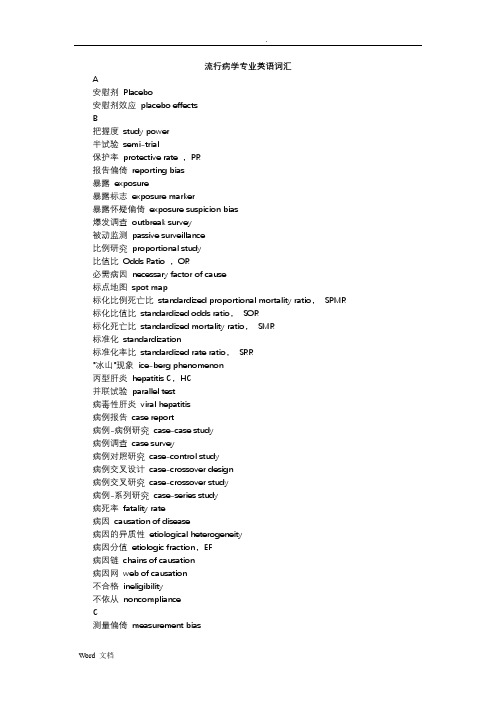
流行病学专业英语词汇A安慰剂Placebo安慰剂效应placebo effectsB把握度study power半试验semi-trial保护率protective rate ,PR报告偏倚reporting bias暴露exposure暴露标志exposure marker暴露怀疑偏倚exposure suspicion bias爆发调查outbreak survey被动监测passive surveillance比例研究proportional study比值比Odds Ratio ,OR必需病因necessary factor of cause标点地图spot map标化比例死亡比standardized proportional mortality ratio,SPMR 标化比值比standardized odds ratio,SOR标化死亡比standardized mortality ratio,SMR标准化standardization标准化率比standardized rate ratio,SRR"冰山"现象ice-berg phenomenon丙型肝炎hepatitis C,HC并联试验parallel test病毒性肝炎viral hepatitis病例报告case report病例-病例研究case-case study病例调查case survey病例对照研究case-control study病例交叉设计case-crossover design病例交叉研究case-crossover study病例-系列研究case-series study病死率fatality rate病因causation of disease病因的异质性etiological heterogeneity病因分值etiologic fraction,EF病因链chains of causation病因网web of causation不合格ineligibility不依从noncomplianceC测量偏倚measurement bias长期变异secular change,trend variation超额死亡率excess mortality超额危险度excess risk巢式病例对照研究nested case-control study成本效果分析cost -effectiveness analysis成本效益分析cost-benefit analysis成本效用分析cost-utility成组匹配category matching抽样调查sampling survey抽样框架sampling frame抽样误差sampling error出生队列birth cohort出生队列分析法birth cohort analysis初级卫生保健primary health care ,PHC传播概率transmission probability传播机制mechanism of transmission传播途径path of transmission传播途径transmission route传播因素transmitting factor传染病communicable diseases传染过程infectious process传染性infectiousness串联试验serial test粗死亡率crude death rate改成crude mortality rate 较好粗一致性crude agreement促成病因contributory factor of cause错分偏倚misclassification bias错误分类misclassificationD大骨节病Kashin-Beck disease大流行pandemic代表性representativeness单倍型haplotype单纯随机抽样simple random sampling单盲single blind单项筛检single screening等位基因allele等位基因频率gene frequency地病endemic diseases地病学Endemiology地性endemicity地性氟中毒endemic fluorosis地性砷中毒endemic arsenism点突变point mutation点源流行point source epidemic碘缺乏病iodine deficiency disease调查随访研究survey follow-up study调整一致性adjusted agreement丁型肝炎hepatitis D,HD动态人群dynamic population毒力virulence短期波动irregular variation,rapid fluctuation队列cohort队列研究cohort study对象报告偏倚report bias多归因程序的法Multiple imputation procedure多国心血管病趋势和决定因素监测Multinational Monitoring of Trends and Determinants inardiovascular Diseases,MONICA多级抽样multistage sampling多群组比较研究multi-group comparison study多态性polymorphism多项筛检multiple screeningE恶性肿瘤流行病学cancer Epidemiology二代侵袭率,续发率secondary attack rate,SAR二级预防secondary preventionF发病率incidence rate,morbidity发病密度incidence density发病密度incidence density发生率研究incidence study飞沫droplet飞沫核droplet nuclei非即时性non-concurrent非均衡性错分differential misclassification非连续性状Discrete traits肺炎与流感死亡率pneumonia and influenza deaths,即P&I deaths分层stratification分层抽样stratified sampling分层随机分组stratified randomization分类变量categorical variable分离分析segregation analysis分子流行病学Molecular Epidemiology封闭性抗体blocking antibodies氟斑牙dental fluorosis氟骨症skeletal fluorosis负混杂negative confounding复等位基因位点multiple alles复杂性状complex traitG概念框架conceptual framework干预随访研究intervention follow-up study感染储主reservoir of infection感染来源source of infection感染力infectivity感染谱spectrum of infection感染梯度gradient of infection感染性腹泻infectious diarrhea感染性腹泻病infectious diarrheal disease感染症infections or infectious diseases高危人群策略high risk strategy个案case个案调查case study个案调查individual survey个体匹配individual matching工程干预engineering intervention共变法method of concomitant variation共显性codominance构成比proportion固定队列fixed cohort故意伤害intentional injuries关联的合理性plausibility of association关联的可重复性consistency of association关联的强度strength of association关联的时间性temporality of association关联的特异性specificity of association关联的一致性coherence of association观察偏倚observational bias观察性研究observational study观察一致率observation agreement广义遗传度broad heritability归因危险度attributable risk归因危险度百分比attributable risk percent,ARP,或AR%国际病毒分类委员会International Committee on Taxonomy of Viruses,ICTV 国际冠心病预防工作组The International Task Force for Prevention of Coronary Heart Disease国际疾病分类第十版International Classification of Diseases,ICD-10结核病防治项目National Tuberculosis Program,NTP卫生统计中心the National Center for Health Statistics,NCHSH合作率cooperation rate核心家系Nuclear families横断面研究cross sectional analysis横断面研究cross-sectional study患病率prevalence rate回顾性研究retrospective studies回忆偏倚recall bias混合型流行mixed epidemic混合研究mixed study混杂confounding混杂偏倚confounding bias混杂因素confounder,confounding factor活跃病区active endemic area获得性免疫缺陷综合症acquired immunodeficiency syndrome,AIDS 霍桑效应Howthorne effectJ机遇chance基本繁殖率basic reproduction rate基本繁殖数basic reproductive number,R0基本人群base population or population at risk基线信息baseline information基因gene基因毒性genotoxic基因型Genotyping基因型频率genotype frequency及时性timeliness疾病爆发disease outbreak疾病标志Markers of disease疾病的分布distribution of disease疾病的自然史natural history of disease疾病监测surveillance of disease疾病链the disease chain剂量反应关系dose-response relationship季节性seasonal variation,seasonality继发关联secondary association家庭簇研究family cluster study家庭聚集性Familial aggregation家庭聚集性研究familial aggregation study家庭相似性Family resemblance家系研究pedigree study甲型肝炎hepatitis A,HA假阳性率false positive rate假阴性率false negative rate间接传播indirect transmission间接关联indirect association间接接触indirect contact检出症侯偏倚detection signal bias简单随机分组simple randomization简明损伤定级法abbreviated injury scale,AIS健康促进health promotion健康工作者效应healthy worker effect健康监测系统health information system,HIS健康生命损失年years of life lived with disability,YLLD 教育干预educational intervention结局outcome结局变量outcome variable截断点cutoff金标准gold standard经济干预economic intervention经节肢动物媒介vector-borne经空气air-borne经食物food-borne经饮水drinking water-borne经载体vehicle-borne精确性precision聚合酶链式反应polymerase chain reaction,PCR均衡性错分non-differential misclassification均数回归趋势regression to the meanK抗原漂移antigenic drift抗原转变antigenic shift克山病Keshan disease空间、时间集研究space-time cluster study扩大免疫计划expanded program on immunization,EPI L来源同一identity by descent,IBD类试验,准试验quasi-trial,quasi-experiment类推法method of analogy累积发病率cumulative incidence罹患率attack rate礼貌偏倚politeness bias理论流行病学theoretical epidemiology历史性historical连锁linkage连锁不平衡linkage disequilibrium连锁分析Linkage analysis连锁平衡linkage equilibrium联合无应答偏倚combined nonrespondent bias联系率contact rate临床试验clinical trial灵敏度sensitivity领先时间偏倚lead time bias流感病毒influenza virus流行epidemic流行病模型epidemic model流行病学epidemiology流行病学监测epidemiological surveillance流行病学实验epidemiological experiment流行过程epidemic process流行曲线epidemic curve流行性出血热epidemic hemorrhagic fever,EHF流行性感冒Influenza流行性肾病nephropathia epidemica,NE率rate率比rate ratio率差rate difference,RD轮状模式wheel modeM蔓延流行propagated or progressive epidemic盲法blindness美国胆固醇教育规划National Cholesterol Education Program,NCEP 描述流行病学descriptive epidemiology描述性研究descriptive study目标人群target populationN暴露剂量Internal Dose部有效性internal validity剂量internal dose剂量的测定internal dose meters纳入/排除偏倚inclusion/exclusion bias奈曼偏倚Neyman biasP排除exclusions排除法method of exclusion排除偏倚exclusive bias配对pair matching"皮鞋"流行病学shoeleather epidemiology匹配matching匹配变量matching variable匹配过头overmatching匹配因素matching factors偏倚bias频数匹配frequency matching普查censusQ前瞻性prospective 8前瞻性研究prospective study潜伏期incubation period潜隐期latent period潜在工作损失年数Working Years of Potential Life Lost,WYPLL潜在价值损失年数Valued Years of Potential Life Lost,VYPLL潜在寿命损失年potential years of life lost,PYLL强制干预enforcement intervention求同法method of agreement求异法method of difference全人群策略population strategy缺课天数days lost from school缺勤天数days lost from work缺失数据missing data确定性检验explicit testing确定性模型deterministic modelR人传人person to person spread人类传染病anthroponosis人类基因组计划human genome project人类免疫缺陷病毒human immunodeficiency virus,HIV人群population人群病因分值population etiologic fraction,PEF人群的分层population stratification人群归因危险度population attributable risk,PAR人群归因危险度百分比population attributable risk percent,PARP 或PAR% 人群免疫性herd immunity人群易感性herd susceptibility人兽共患病,动物传染病zoonosis人畜共患病anthropozoonosis日期型date type入院率偏倚(伯克森偏倚)admission rate bias (Berkson's bias)。
流行病学知识点【完整版】详解
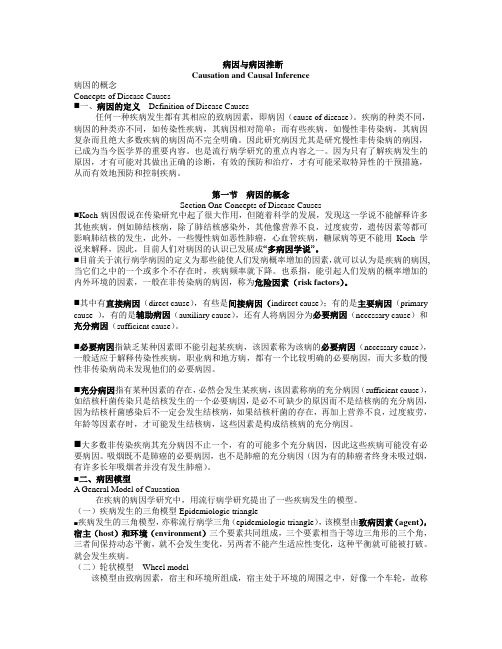
病因与病因推断Causation and Causal Inference病因的概念Concepts of Disease Causes⏹一、病因的定义Definition of Disease Causes任何一种疾病发生都有其相应的致病因素,即病因(cause of disease)。
疾病的种类不同,病因的种类亦不同,如传染性疾病,其病因相对简单;而有些疾病,如慢性非传染病,其病因复杂而且绝大多数疾病的病因尚不完全明确。
因此研究病因尤其是研究慢性非传染病的病因,已成为当今医学界的重要内容。
也是流行病学研究的重点内容之一。
因为只有了解疾病发生的原因,才有可能对其做出正确的诊断,有效的预防和治疗,才有可能采取特异性的干预措施,从而有效地预防和控制疾病。
第一节病因的概念Section One Concepts of Disease Causes⏹Koch病因假说在传染研究中起了很大作用,但随着科学的发展,发现这一学说不能解释许多其他疾病,例如肺结核病,除了肺结核感染外,其他像营养不良,过度疲劳,遗传因素等都可影响肺结核的发生,此外,一些慢性病如恶性肺癌,心血管疾病,糖尿病等更不能用Koch学说来解释,因此,目前人们对病因的认识已发展成“多病因学说”。
⏹目前关于流行病学病因的定义为那些能使人们发病概率增加的因素,就可以认为是疾病的病因, 当它们之中的一个或多个不存在时,疾病频率就下降。
也系指,能引起人们发病的概率增加的内外环境的因素,一般在非传染病的病因,称为危险因素(risk factors)。
⏹其中有直接病因(direct cause),有些是间接病因(indirect cause);有的是主要病因(primary cause ),有的是辅助病因(auxiliary cause),还有人将病因分为必要病因(necessary cause)和充分病因(sufficient cause)。
⏹必要病因指缺乏某种因素即不能引起某疾病,该因素称为该病的必要病因(necessary cause),一般适应于解释传染性疾病,职业病和地方病,都有一个比较明确的必要病因,而大多数的慢性非传染病尚未发现他们的必要病因。
流行病学调查发言稿英文

流行病学调查发言稿英文Ladies and gentlemen,Good morning/afternoon/evening. First of all, I would like to extend my gratitude to all of you for being here today. I am honored to have the opportunity to present my research findings on the epidemiological investigation of a frequently occurring infectious disease. The purpose of this investigation was to provide insights into the patterns, causes, and effects of the disease in order to develop effective strategies for prevention and control. Introduction:Before we delve into the details of the investigation, let me give you a brief introduction to epidemiology. Epidemiology is a branch of medical science that deals with the distribution, determinants, and control of diseases in populations. It involves studying the frequency and pattern of diseases, as well as the factors that influence their occurrence.Objective:The main objective of this investigation was to understand the characteristics of the disease, including its incidence, prevalence, risk factors, transmission pathways, and impact on the population. By identifying these factors, we hoped to gain a better understanding of the disease and develop evidence-based interventions to control its spread.Methods:To conduct this investigation, we employed a retrospective cohort study design. We collected data from medical records, laboratoryreports, and interviews with affected individuals. The data collected included demographic information, clinical symptoms, laboratory test results, and treatment outcomes. Additionally, we conducted surveys to assess risk factors, personal hygiene practices, and knowledge about the disease among the general population. Results:The results of this investigation revealed several key findings. Firstly, the disease had an overall incidence rate of 10 cases per 100,000 population, with a higher prevalence among males. Secondly, the disease showed a seasonal pattern, with peak incidence occurring during the summer months. Thirdly, the most common clinical symptoms included fever, cough, and headache. Laboratory tests confirmed the presence of the disease in all affected individuals. Furthermore, our survey identified several risk factors, such as close contact with infected individuals, poor hand hygiene, and exposure to contaminated environments. Discussion:The findings of this investigation have significant implications for public health. The high incidence rate of the disease suggests that it is a major public health concern. The identified risk factors provide insights into the modes of transmission, which can guide the development of preventive strategies. For instance, promoting hand hygiene and educating the public about the importance of personal protective measures can help reduce transmission. Moreover, the seasonal pattern of the disease suggests a possible link with environmental factors, which warrants further investigation.Conclusion:In conclusion, this epidemiological investigation provided valuable insights into the occurrence, transmission, and impact of the disease. The findings can serve as a basis for developing effective prevention and control strategies. It is important to continue monitoring the disease and conducting further research to better understand its dynamics and improve intervention measures. I would like to express my gratitude to all those who contributed to this investigation, including the study participants, healthcare professionals, and research team members.Thank you once again for your attention. I would be happy to answer any questions you may have.。
流行病学总结材料
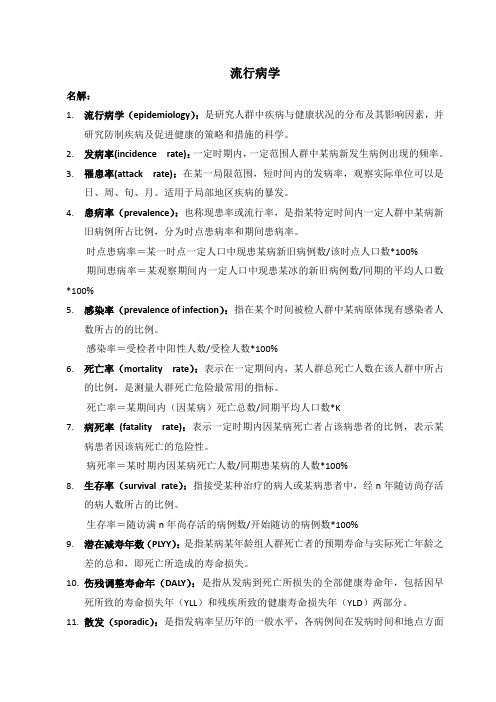
流行病学名解:1.流行病学(epidemiology):是研究人群中疾病与健康状况的分布及其影响因素,并研究防制疾病及促进健康的策略和措施的科学。
2.发病率(incidence rate):一定时期内,一定范围人群中某病新发生病例出现的频率。
3.罹患率(attack rate):在某一局限范围,短时间内的发病率,观察实际单位可以是日、周、旬、月。
适用于局部地区疾病的暴发。
4.患病率(prevalence):也称现患率或流行率,是指某特定时间内一定人群中某病新旧病例所占比例,分为时点患病率和期间患病率。
时点患病率=某一时点一定人口中现患某病新旧病例数/该时点人口数*100%期间患病率=某观察期间内一定人口中现患某冰的新旧病例数/同期的平均人口数*100%5.感染率(prevalence of infection):指在某个时间被检人群中某病原体现有感染者人数所占的的比例。
感染率=受检者中阳性人数/受检人数*100%6.死亡率(mortality rate):表示在一定期间内,某人群总死亡人数在该人群中所占的比例,是测量人群死亡危险最常用的指标。
死亡率=某期间内(因某病)死亡总数/同期平均人口数*K7.病死率(fatality rate):表示一定时期内因某病死亡者占该病患者的比例,表示某病患者因该病死亡的危险性。
病死率=某时期内因某病死亡人数/同期患某病的人数*100%8.生存率(survival rate):指接受某种治疗的病人或某病患者中,经n年随访尚存活的病人数所占的比例。
生存率=随访满n年尚存活的病例数/开始随访的病例数*100%9.潜在减寿年数(PLYY):是指某病某年龄组人群死亡者的预期寿命与实际死亡年龄之差的总和,即死亡所造成的寿命损失。
10.伤残调整寿命年(DALY):是指从发病到死亡所损失的全部健康寿命年,包括因早死所致的寿命损失年(YLL)和残疾所致的健康寿命损失年(YLD)两部分。
流行病学英文总结
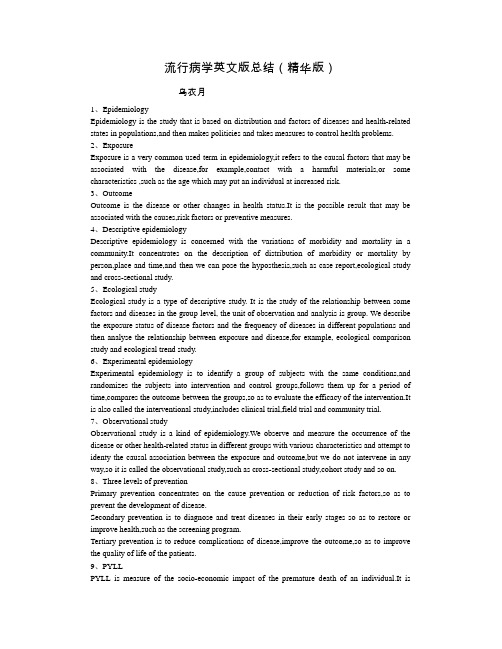
流行病学英文版总结(精华版)乌衣月Email:Frnbdx@1、EpidemiologyEpidemiology is the study that is based on distribution and factors of diseases and health-related states in populations,and then makes politicies and takes measures to control heslth problems.2、ExposureExposure is a very common used term in epidemiology,it refers to the causal factors that may be associated with the disease,for example,contact with a harmful materials,or some characteristics ,such as the age which may put an individual at increased risk.3、OutcomeOutcome is the disease or other changes in health status.It is the possible result that may be associated with the causes,risk factors or preventive measures.4、Descriptive epidemiologyDescriptive epidemiology is concerned with the variations of morbidity and mortality in a community.It concentrates on the description of distribution of morbidity or mortality by person,place and time,and then we can pose the hyposthesis,such as case report,ecological study and cross-sectional study.5、Ecological studyEcological study is a type of descriptive study.It is the study of the relationship between some factors and diseases in the group level, the unit of observation and analysis is group.We describe the exposure status of disease factors and the frequency of diseases in different populations and then analyse the relationship between exposure and disease,for example, ecological comparison study and ecological trend study.6、Experimental epidemiologyExperimental epidemiology is to identify a group of subjects with the same conditions,and randomizes the subjects into intervention and control groups,follows them up for a period of time,compares the outcome between the groups,so as to evaluate the efficacy of the intervention.It is also called the interventional study,includes clinical trial,field trial and community trial.7、Observational studyObservational study is a kind of epidemiology.We observe and measure the occurrence of the disease or other health-related status in different groups with various characteristics and attempt to identy the causal association between the exposure and outcome,but we do not intervene in any way,so it is called the observational study,such as cross-sectional study,cohort study and so on.8、Three levels of preventionPrimary prevention concentrates on the cause prevention or reduction of risk factors,so as to prevent the development of disease.Secondary prevention is to diagnose and treat diseases in their early stages so as to restore or improve health,such as the screening program.Tertiary prevention is to reduce complications of disease,improve the outcome,so as to improve the quality of life of the patients.9、PYLLPYLL is measure of the socio-economic impact of the premature death of an individual.It ismeasured by deducting the age of death from the life expectancy of the individual.10、IncidenceIncidence measures the rate of occurrence of new cases of disease in a given population in a given time and can be used to describe the risk of disease in that population.(number of new cases/population)10、PrevalencePrevalence measures the rate of occurrence of both new and ongoing cases of diseases in a given population,in a given time,and can be used to describe the burden of disease in that population,includes point prevalence and period prevalence.(number of existing cases/population at risk)11、Cross-sectional studyCross-sectional study is a type of descriptive study,is also called prevalence study.It is an investigation that systematically collects information in a given time and does not use intervention.It concentrates on description of the distribution of prevalence rate by person,place,and time,and then we can pose the hyposthesis.12、BiasBias is a systematic error ,it exsits in the design ,conduct or analysis of a study and it may result in a mistaken estimate of the association between the exposure and outcome,such as selection bias,information bias,confounding bias.13、Confounding biasConfounding variable is an extraneous factor that relates(positively or negatively)with both the outcome and the tentative factor of study ,and may result in a mistaken estimate of an exposure effect on the risk of disease.And the bias which is caused by the confounding variable is called confounding bias.14、ScreeningScreening is the early detection and presumptive identification of an unrecognized disease or deficit by application of examinations or tests which can be applied rapidly and cheaply to large populations.15、Cohort studyCohort study is a kind of observational study.The investigator selects a group of exposed individuals and a group(or groups)of non-exposed individuals,and follows up both groups for a period of time,to compare the incidence of disease or the death rate of the disease in the two groups(or more groups)and measure the association between the exposure and the outcome.It is also called a prospective study or follow-up study.16、Case-control studiesCase-control studies start with the identification of people with the disease of interst and a control group of people without this disease ,then collect some information of the exposure in both groups,and measure the association between the exposure and the disease by comparing the diseased and non-diseased group.It is a kind of observational study ,and it is also called the retrospective study.17、MatchingMatching is defined as the process of making a study group and a comparison group comparable with respect to certain characteristics,such as sex,age,race and so on.The puepose of matching is to reduce the likelihood of confounding,includes individual matching and frequency matching.18、OROR is a very useful measure for the association between exposure and outcome.It is the ratio of the odds of exposure among the cases to the odds of exposure among the controls.The more the or departs from one,the greater the association between the exposure and outcome.19、RRRR is the most common measure for the association between esposure and outcome.The meaning is how many times the risk of exposed people is that of unexposed.If RR=1 it means the risk in exposed group and unexposed group are equal ,there is no association between the exposure and the outcome.If RR>1 it means the risk in exposed group is greater than the unexposed group,there is a positive association between the exposure and the outcome.If RR<1 it means the risk in exposed group is less than the unexposed group,there is a negative association between the exposure and the outcome.20、ARAR is a very important and commom measure for the effect of the exposure.It is the difference of the risks between the exposed group an unexposed group.The AR can be interpreted as the risk caused by the exposure only,or the risk attributable to the exposure.21、CauseCause may indicate that the factors that may increase the probability of the disease and that a diminution of one or more of these factors may decrease the frequency of that disease.22.Case Control & Cohort Study DifferencesCase Control Studies Cohort StudyAdvantages They are quicker and inexpensive to conduct It can measure the incidence ofdisease,so it can tmeasure RR They are good for rare diseases It good for rare exposuresThe sample size is smaller than cohort study It is prospective and permitsmultiple outcomes to beassessed in the same studyThey are good for new serious diseases to explore the possible causes The temporal sequence is appropriate,so it good for causal association inferenceDisadvantages They are retrospective,temporal sequence maybe a problem,so it is difficult to establish theassociation between exposure and diseases It requires large sample sizes and need long follow-up periodsThere are some potential biases,such asselection bias,recall biasIt is very expensiveThey can not measure the incidence of disease,therefore can not measure RR It is inefficient for rare diseasesThey are iefficient for rare exposures Some biases:loss to follow-upbias,measurement bias23、Molecular epidemiologyMolecular epidemiology is a branch of epidemiology.It combines theories and methods in both epidemiology and molecular biology.The definition of molecular epidemiology is its use of biological and genetic markers as a measure of the prospensity of developing a disease or as an indicator of a disease or all exposure in the studies of the distribution and causes of disease. Molecular epidemiology has the same objectives as conventional epidemiology,to study the occurrence,development and prognosis of disease,to evaluate the effectiveness of interventions,and to provide evidence for clinical and healthcare decision making in a defined population.References:((1)李立明主编.流行病学.第6版.北京:人民卫生出版社.2007(2)赵仲堂主编.流行病学研究方法与应用.第2版.北京:科学出版社,2005(3)Wang Peishan.Epidemiology An Introduction for Medical Students.Tianjin:Tianjin Science and Technology Translation Publishing Company,2011(4)Rothman KJ. Epidemiology:An Introduction.New York:Oxford University Press,2002 (5)方积乾主编.卫生统计学第6版.北京:人民卫生出版社.2007(6)颜虹主编.医学统计学第2版.北京:人民卫生出版社.2010(流行病学和卫生统计学两部分,以流行病学为主,由于水平有限,时间有限,存在各种问题不可避免,还望指出纠正!)乌衣月2013年4月13日。
流行病学总结

第1.1章1. 流行病学 epidemiology:研究疾病及健康有关状态在人群中发生、发展的原因和分布的规律,以及制定预防、控制和消灭这些疾病及促进健康的对策及措施,并评价其效果的科学。
第1.2章1. 疾病分布distribution of disease: 通过观察疾病在人群中的发生、发展和消退,描述疾病不同时间、不同地区和不同人群中的频率及分布的现象。
2. 发病率 (incidence rate): 是一定时期内,特定人群中发生某病新发病例的频率。
3. 罹患率 (attack rate):测量新发病例频率的指标,通常指在某一局限范围内,短时间内的发病率。
4. 患病率 (prevalence rate):指某特定时间内总人口中某病新旧病例所占的比例。
5. 死亡率 (mortality rate):指某人群在一定时期内总死亡人数及该人群同期平均人口数之比。
6. 病死率 (fatality rate):指一定时间内,患某病的病人中因该病而死亡者的比值。
7. 散发 (sporadic):指某病发病人数不多,病例间无明显的相互传播关系,或在一定地区的发病率呈历年一般水平。
8. 流行 (epidemic):指某地区某病发病率显著超过历年的散发发病率水平。
9. 大流行 (pandemic):指某疾病的发病蔓延迅速,涉及地域广,人口比例大,在短时间内可以越过省界国界甚至洲界形成世界性流行。
10. 爆发 (outbreak):指在集体单位或小居民区短时间内某病的发病人数突然大量增多的现象。
11. 周期性 (periodicity):疾病有规律地在一定的时间间隔后发生流行的现象。
12. 长期变异 (secular change):是指在一个相当长的时间内(多为几年或几十年),观察探讨疾病的临床表现、发病率、死亡率的变化或它们同时发生的变化情况。
13. 移民流行病学 (migrant epidemiology):是利用移民人群研究疾病分布,观察某病在移民人群、移居国当地人群及原居住地人群的发病率或死亡率的差别,以探讨该病的发生及遗传和环境的关系,从而找出病因的方法。
(完整版)流行病学专业英语词汇
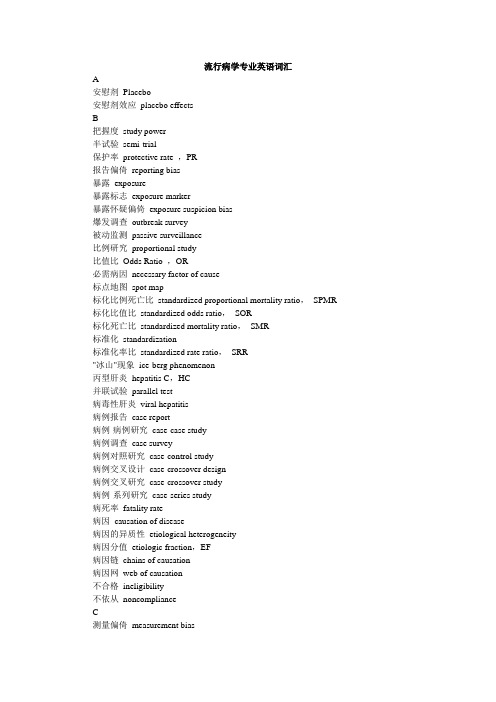
流行病学专业英语词汇A安慰剂Placebo安慰剂效应placebo effectsB把握度study power半试验semi-trial保护率protective rate ,PR报告偏倚reporting bias暴露exposure暴露标志exposure marker暴露怀疑偏倚exposure suspicion bias爆发调查outbreak survey被动监测passive surveillance比例研究proportional study比值比Odds Ratio ,OR必需病因necessary factor of cause标点地图spot map标化比例死亡比standardized proportional mortality ratio,SPMR 标化比值比standardized odds ratio,SOR标化死亡比standardized mortality ratio,SMR标准化standardization标准化率比standardized rate ratio,SRR"冰山"现象ice-berg phenomenon丙型肝炎hepatitis C,HC并联试验parallel test病毒性肝炎viral hepatitis病例报告case report病例-病例研究case-case study病例调查case survey病例对照研究case-control study病例交叉设计case-crossover design病例交叉研究case-crossover study病例-系列研究case-series study病死率fatality rate病因causation of disease病因的异质性etiological heterogeneity病因分值etiologic fraction,EF病因链chains of causation病因网web of causation不合格ineligibility不依从noncomplianceC测量偏倚measurement bias长期变异secular change,trend variation超额死亡率excess mortality超额危险度excess risk巢式病例对照研究nested case-control study成本效果分析cost -effectiveness analysis成本效益分析cost-benefit analysis成本效用分析cost-utility成组匹配category matching抽样调查sampling survey抽样框架sampling frame抽样误差sampling error出生队列birth cohort出生队列分析法birth cohort analysis初级卫生保健primary health care ,PHC传播概率transmission probability传播机制mechanism of transmission传播途径path of transmission传播途径transmission route传播因素transmitting factor传染病communicable diseases传染过程infectious process传染性infectiousness串联试验serial test粗死亡率crude death rate改成crude mortality rate 较好粗一致性crude agreement促成病因contributory factor of cause错分偏倚misclassification bias错误分类misclassificationD大骨节病Kashin-Beck disease大流行pandemic代表性representativeness单倍型haplotype单纯随机抽样simple random sampling单盲single blind单项筛检single screening等位基因allele等位基因频率gene frequency地方病endemic diseases地方病学Endemiology地方性endemicity地方性氟中毒endemic fluorosis地方性砷中毒endemic arsenism点突变point mutation点源流行point source epidemic碘缺乏病iodine deficiency disease调查随访研究survey follow-up study调整一致性adjusted agreement丁型肝炎hepatitis D,HD动态人群dynamic population毒力virulence短期波动irregular variation,rapid fluctuation队列cohort队列研究cohort study对象报告偏倚report bias多归因程序的方法Multiple imputation procedure多国心血管病趋势和决定因素监测Multinational Monitoring of Trends and Determinants inardiovascular Diseases,MONICA 多级抽样multistage sampling多群组比较研究multi-group comparison study多态性polymorphism多项筛检multiple screeningE恶性肿瘤流行病学cancer Epidemiology二代侵袭率,续发率secondary attack rate,SAR二级预防secondary preventionF发病率incidence rate,morbidity发病密度incidence density发病密度incidence density发生率研究incidence study飞沫droplet飞沫核droplet nuclei非即时性non-concurrent非均衡性错分differential misclassification非连续性状Discrete traits肺炎与流感死亡率pneumonia and influenza deaths,即P&I deaths分层stratification分层抽样stratified sampling分层随机分组stratified randomization分类变量categorical variable分离分析segregation analysis分子流行病学Molecular Epidemiology封闭性抗体blocking antibodies氟斑牙dental fluorosis氟骨症skeletal fluorosis负混杂negative confounding复等位基因位点multiple alles复杂性状complex traitG概念框架conceptual framework干预随访研究intervention follow-up study感染储主reservoir of infection感染来源source of infection感染力infectivity感染谱spectrum of infection感染梯度gradient of infection感染性腹泻infectious diarrhea感染性腹泻病infectious diarrheal disease感染症infections or infectious diseases高危人群策略high risk strategy个案case个案调查case study个案调查individual survey个体匹配individual matching工程干预engineering intervention共变法method of concomitant variation共显性codominance构成比proportion固定队列fixed cohort故意伤害intentional injuries关联的合理性plausibility of association关联的可重复性consistency of association关联的强度strength of association关联的时间性temporality of association关联的特异性specificity of association关联的一致性coherence of association观察偏倚observational bias观察性研究observational study观察一致率observation agreement广义遗传度broad heritability归因危险度attributable risk归因危险度百分比attributable risk percent,ARP,或AR%国际病毒分类委员会International Committee on Taxonomy of Viruses,ICTV 国际冠心病预防工作组The International Task Force for Prevention of Coronary Heart Disease国际疾病分类第十版International Classification of Diseases,ICD-10国家结核病防治项目National Tuberculosis Program,NTP国家卫生统计中心the National Center for Health Statistics,NCHSH合作率cooperation rate核心家系Nuclear families横断面研究cross sectional analysis横断面研究cross-sectional study患病率prevalence rate回顾性研究retrospective studies回忆偏倚recall bias混合型流行mixed epidemic混合研究mixed study混杂confounding混杂偏倚confounding bias混杂因素confounder,confounding factor活跃病区active endemic area获得性免疫缺陷综合症acquired immunodeficiency syndrome,AIDS 霍桑效应Howthorne effectJ机遇chance基本繁殖率basic reproduction rate基本繁殖数basic reproductive number,R0基本人群base population or population at risk基线信息baseline information基因gene基因毒性genotoxic基因型Genotyping基因型频率genotype frequency及时性timeliness疾病爆发disease outbreak疾病标志Markers of disease疾病的分布distribution of disease疾病的自然史natural history of disease疾病监测surveillance of disease疾病链the disease chain剂量反应关系dose-response relationship季节性seasonal variation,seasonality继发关联secondary association家庭簇研究family cluster study家庭聚集性Familial aggregation家庭聚集性研究familial aggregation study家庭相似性Family resemblance家系研究pedigree study甲型肝炎hepatitis A,HA假阳性率false positive rate假阴性率false negative rate间接传播indirect transmission间接关联indirect association间接接触indirect contact检出症侯偏倚detection signal bias简单随机分组simple randomization简明损伤定级法abbreviated injury scale,AIS健康促进health promotion健康工作者效应healthy worker effect健康监测系统health information system,HIS健康生命损失年years of life lived with disability,YLLD 教育干预educational intervention结局outcome结局变量outcome variable截断点cutoff金标准gold standard经济干预economic intervention经节肢动物媒介vector-borne经空气air-borne经食物food-borne经饮水drinking water-borne经载体vehicle-borne精确性precision聚合酶链式反应polymerase chain reaction,PCR均衡性错分non-differential misclassification均数回归趋势regression to the meanK抗原漂移antigenic drift抗原转变antigenic shift克山病Keshan disease空间、时间集研究space-time cluster study扩大免疫计划expanded program on immunization,EPIL来源同一identity by descent,IBD类试验,准试验quasi-trial,quasi-experiment类推法method of analogy累积发病率cumulative incidence罹患率attack rate礼貌偏倚politeness bias理论流行病学theoretical epidemiology历史性historical连锁linkage连锁不平衡linkage disequilibrium连锁分析Linkage analysis连锁平衡linkage equilibrium联合无应答偏倚combined nonrespondent bias联系率contact rate临床试验clinical trial灵敏度sensitivity领先时间偏倚lead time bias流感病毒influenza virus流行epidemic流行病模型epidemic model流行病学epidemiology流行病学监测epidemiological surveillance流行病学实验epidemiological experiment流行过程epidemic process流行曲线epidemic curve流行性出血热epidemic hemorrhagic fever,EHF流行性感冒Influenza流行性肾病nephropathia epidemica,NE率rate率比rate ratio率差rate difference,RD轮状模式wheel modeM蔓延流行propagated or progressive epidemic盲法blindness美国国家胆固醇教育规划National Cholesterol Education Program,NCEP 描述流行病学descriptive epidemiology描述性研究descriptive study目标人群target populationN内暴露剂量Internal Dose内部有效性internal validity内剂量internal dose内剂量的测定internal dose meters纳入/排除偏倚inclusion/exclusion bias奈曼偏倚Neyman biasP排除exclusions排除法method of exclusion排除偏倚exclusive bias配对pair matching"皮鞋"流行病学shoeleather epidemiology匹配matching匹配变量matching variable匹配过头overmatching匹配因素matching factors偏倚bias频数匹配frequency matching普查censusQ前瞻性prospective 8前瞻性研究prospective study潜伏期incubation period潜隐期latent period潜在工作损失年数Working Years of Potential Life Lost,WYPLL潜在价值损失年数Valued Years of Potential Life Lost,VYPLL潜在寿命损失年potential years of life lost,PYLL强制干预enforcement intervention求同法method of agreement求异法method of difference全人群策略population strategy缺课天数days lost from school缺勤天数days lost from work缺失数据missing data确定性检验explicit testing确定性模型deterministic modelR人传人person to person spread人类传染病anthroponosis人类基因组计划human genome project人类免疫缺陷病毒human immunodeficiency virus,HIV人群population人群病因分值population etiologic fraction,PEF人群的分层population stratification人群归因危险度population attributable risk,PAR人群归因危险度百分比population attributable risk percent,PARP 或PAR% 人群免疫性herd immunity人群易感性herd susceptibility人兽共患病,动物传染病zoonosis人畜共患病anthropozoonosis日期型date type入院率偏倚(伯克森偏倚)admission rate bias (Berkson's bias)。
流行病学队列研究英语小结范文

流行病学队列研究英语小结范文英文回答:Epidemiological cohort studies are a type of research where a group of people is followed over a period of time to observe the development of a particular disease or health outcome. These studies are important for understanding the causes and risk factors for diseases, as well as for evaluating the effectiveness of interventions or treatments.For example, the Nurses' Health Study in the United States has been following a large group of nurses since 1976 to investigate the risk factors for major chronic diseases in women. By collecting data on their lifestyle, diet, and health status over many years, researchers have been able to identify important risk factors for conditions such as heart disease, cancer, and diabetes.中文回答:流行病学队列研究是一种研究方法,通过跟踪一组人一段时间,观察特定疾病或健康结果的发展。
这些研究对于了解疾病的原因和危险因素,以及评估干预或治疗的有效性非常重要。
流行病学专业英语词汇
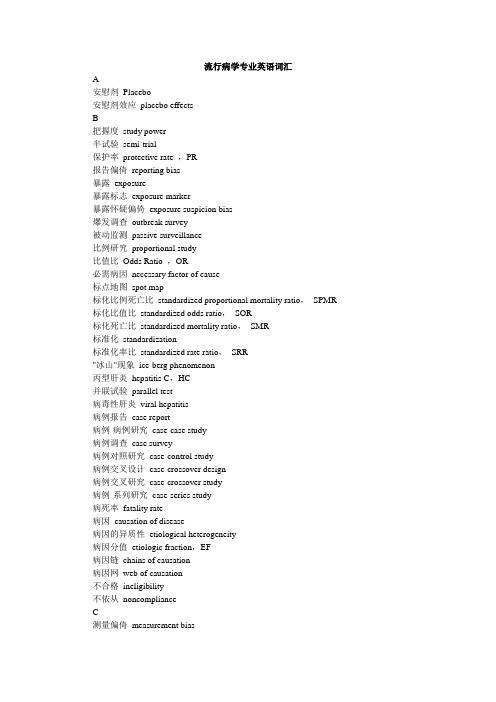
流行病学专业英语词汇A安慰剂Placebo安慰剂效应placebo effectsB把握度study power半试验semi-trial保护率protective rate ,PR报告偏倚reporting bias暴露exposure暴露标志exposure marker暴露怀疑偏倚exposure suspicion bias爆发调查outbreak survey被动监测passive surveillance比例研究proportional study比值比Odds Ratio ,OR必需病因necessary factor of cause标点地图spot map标化比例死亡比standardized proportional mortality ratio,SPMR 标化比值比standardized odds ratio,SOR标化死亡比standardized mortality ratio,SMR标准化standardization标准化率比standardized rate ratio,SRR"冰山"现象ice-berg phenomenon丙型肝炎hepatitis C,HC并联试验parallel test病毒性肝炎viral hepatitis病例报告case report病例-病例研究case-case study病例调查case survey病例对照研究case-control study病例交叉设计case-crossover design病例交叉研究case-crossover study病例-系列研究case-series study病死率fatality rate病因causation of disease病因的异质性etiological heterogeneity病因分值etiologic fraction,EF病因链chains of causation病因网web of causation不合格ineligibility不依从noncomplianceC测量偏倚measurement bias长期变异secular change,trend variation超额死亡率excess mortality超额危险度excess risk巢式病例对照研究nested case-control study成本效果分析cost -effectiveness analysis成本效益分析cost-benefit analysis成本效用分析cost-utility成组匹配category matching抽样调查sampling survey抽样框架sampling frame抽样误差sampling error出生队列birth cohort出生队列分析法birth cohort analysis初级卫生保健primary health care ,PHC传播概率transmission probability传播机制mechanism of transmission传播途径path of transmission传播途径transmission route传播因素transmitting factor传染病communicable diseases传染过程infectious process传染性infectiousness串联试验serial test粗死亡率crude death rate改成crude mortality rate 较好粗一致性crude agreement促成病因contributory factor of cause错分偏倚misclassification bias错误分类misclassificationD大骨节病Kashin-Beck disease大流行pandemic代表性representativeness单倍型haplotype单纯随机抽样simple random sampling单盲single blind单项筛检single screening等位基因allele等位基因频率gene frequency地方病endemic diseases地方病学Endemiology地方性endemicity地方性氟中毒endemic fluorosis地方性砷中毒endemic arsenism点突变point mutation点源流行point source epidemic碘缺乏病iodine deficiency disease调查随访研究survey follow-up study调整一致性adjusted agreement丁型肝炎hepatitis D,HD动态人群dynamic population毒力virulence短期波动irregular variation,rapid fluctuation队列cohort队列研究cohort study对象报告偏倚report bias多归因程序的方法Multiple imputation procedure多国心血管病趋势和决定因素监测Multinational Monitoring of Trends and Determinants inardiovascular Diseases,MONICA 多级抽样multistage sampling多群组比较研究multi-group comparison study多态性polymorphism多项筛检multiple screeningE恶性肿瘤流行病学cancer Epidemiology二代侵袭率,续发率secondary attack rate,SAR二级预防secondary preventionF发病率incidence rate,morbidity发病密度incidence density发病密度incidence density发生率研究incidence study飞沫droplet飞沫核droplet nuclei非即时性non-concurrent非均衡性错分differential misclassification非连续性状Discrete traits肺炎与流感死亡率pneumonia and influenza deaths,即P&I deaths分层stratification分层抽样stratified sampling分层随机分组stratified randomization分类变量categorical variable分离分析segregation analysis分子流行病学Molecular Epidemiology封闭性抗体blocking antibodies氟斑牙dental fluorosis氟骨症skeletal fluorosis负混杂negative confounding复等位基因位点multiple alles复杂性状complex traitG概念框架conceptual framework干预随访研究intervention follow-up study感染储主reservoir of infection感染来源source of infection感染力infectivity感染谱spectrum of infection感染梯度gradient of infection感染性腹泻infectious diarrhea感染性腹泻病infectious diarrheal disease感染症infections or infectious diseases高危人群策略high risk strategy个案case个案调查case study个案调查individual survey个体匹配individual matching工程干预engineering intervention共变法method of concomitant variation共显性codominance构成比proportion固定队列fixed cohort故意伤害intentional injuries关联的合理性plausibility of association关联的可重复性consistency of association关联的强度strength of association关联的时间性temporality of association关联的特异性specificity of association关联的一致性coherence of association观察偏倚observational bias观察性研究observational study观察一致率observation agreement广义遗传度broad heritability归因危险度attributable risk归因危险度百分比attributable risk percent,ARP,或AR%国际病毒分类委员会International Committee on Taxonomy of Viruses,ICTV 国际冠心病预防工作组The International Task Force for Prevention of Coronary Heart Disease国际疾病分类第十版International Classification of Diseases,ICD-10国家结核病防治项目National Tuberculosis Program,NTP国家卫生统计中心the National Center for Health Statistics,NCHSH合作率cooperation rate核心家系Nuclear families横断面研究cross sectional analysis横断面研究cross-sectional study患病率prevalence rate回顾性研究retrospective studies回忆偏倚recall bias混合型流行mixed epidemic混合研究mixed study混杂confounding混杂偏倚confounding bias混杂因素confounder,confounding factor活跃病区active endemic area获得性免疫缺陷综合症acquired immunodeficiency syndrome,AIDS 霍桑效应Howthorne effectJ机遇chance基本繁殖率basic reproduction rate基本繁殖数basic reproductive number,R0基本人群base population or population at risk基线信息baseline information基因gene基因毒性genotoxic基因型Genotyping基因型频率genotype frequency及时性timeliness疾病爆发disease outbreak疾病标志Markers of disease疾病的分布distribution of disease疾病的自然史natural history of disease疾病监测surveillance of disease疾病链the disease chain剂量反应关系dose-response relationship季节性seasonal variation,seasonality继发关联secondary association家庭簇研究family cluster study家庭聚集性Familial aggregation家庭聚集性研究familial aggregation study家庭相似性Family resemblance家系研究pedigree study甲型肝炎hepatitis A,HA假阳性率false positive rate假阴性率false negative rate间接传播indirect transmission间接关联indirect association间接接触indirect contact检出症侯偏倚detection signal bias简单随机分组simple randomization简明损伤定级法abbreviated injury scale,AIS健康促进health promotion健康工作者效应healthy worker effect健康监测系统health information system,HIS健康生命损失年years of life lived with disability,YLLD 教育干预educational intervention结局outcome结局变量outcome variable截断点cutoff金标准gold standard经济干预economic intervention经节肢动物媒介vector-borne经空气air-borne经食物food-borne经饮水drinking water-borne经载体vehicle-borne精确性precision聚合酶链式反应polymerase chain reaction,PCR均衡性错分non-differential misclassification均数回归趋势regression to the meanK抗原漂移antigenic drift抗原转变antigenic shift克山病Keshan disease空间、时间集研究space-time cluster study扩大免疫计划expanded program on immunization,EPIL来源同一identity by descent,IBD类试验,准试验quasi-trial,quasi-experiment类推法method of analogy累积发病率cumulative incidence罹患率attack rate礼貌偏倚politeness bias理论流行病学theoretical epidemiology历史性historical连锁linkage连锁不平衡linkage disequilibrium连锁分析Linkage analysis连锁平衡linkage equilibrium联合无应答偏倚combined nonrespondent bias联系率contact rate临床试验clinical trial灵敏度sensitivity领先时间偏倚lead time bias流感病毒influenza virus流行epidemic流行病模型epidemic model流行病学epidemiology流行病学监测epidemiological surveillance流行病学实验epidemiological experiment流行过程epidemic process流行曲线epidemic curve流行性出血热epidemic hemorrhagic fever,EHF流行性感冒Influenza流行性肾病nephropathia epidemica,NE率rate率比rate ratio率差rate difference,RD轮状模式wheel modeM蔓延流行propagated or progressive epidemic盲法blindness美国国家胆固醇教育规划National Cholesterol Education Program,NCEP 描述流行病学descriptive epidemiology描述性研究descriptive study目标人群target populationN内暴露剂量Internal Dose内部有效性internal validity内剂量internal dose内剂量的测定internal dose meters纳入/排除偏倚inclusion/exclusion bias奈曼偏倚Neyman biasP排除exclusions排除法method of exclusion排除偏倚exclusive bias配对pair matching"皮鞋"流行病学shoeleather epidemiology匹配matching匹配变量matching variable匹配过头overmatching匹配因素matching factors偏倚bias频数匹配frequency matching普查censusQ前瞻性prospective 8前瞻性研究prospective study潜伏期incubation period潜隐期latent period潜在工作损失年数Working Years of Potential Life Lost,WYPLL潜在价值损失年数Valued Years of Potential Life Lost,VYPLL潜在寿命损失年potential years of life lost,PYLL强制干预enforcement intervention求同法method of agreement求异法method of difference全人群策略population strategy缺课天数days lost from school缺勤天数days lost from work缺失数据missing data确定性检验explicit testing确定性模型deterministic modelR人传人person to person spread人类传染病anthroponosis人类基因组计划human genome project人类免疫缺陷病毒human immunodeficiency virus,HIV人群population人群病因分值population etiologic fraction,PEF人群的分层population stratification人群归因危险度population attributable risk,PAR人群归因危险度百分比population attributable risk percent,PARP 或PAR% 人群免疫性herd immunity人群易感性herd susceptibility人兽共患病,动物传染病zoonosis人畜共患病anthropozoonosis日期型date type入院率偏倚(伯克森偏倚)admission rate bias (Berkson's bias)。
流行病复习资料总结
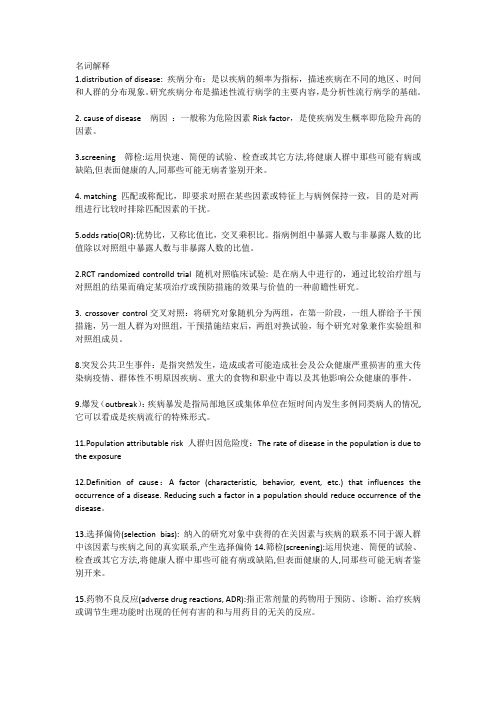
名词解释1.distribution of disease: 疾病分布:是以疾病的频率为指标,描述疾病在不同的地区、时间和人群的分布现象。
研究疾病分布是描述性流行病学的主要内容,是分析性流行病学的基础。
2. cause of disease 病因:一般称为危险因素Risk factor,是使疾病发生概率即危险升高的因素。
3.screening 筛检:运用快速、简便的试验、检查或其它方法,将健康人群中那些可能有病或缺陷,但表面健康的人,同那些可能无病者鉴别开来。
4. matching 匹配或称配比,即要求对照在某些因素或特征上与病例保持一致,目的是对两组进行比较时排除匹配因素的干扰。
5.odds ratio(OR):优势比,又称比值比,交叉乘积比。
指病例组中暴露人数与非暴露人数的比值除以对照组中暴露人数与非暴露人数的比值。
2.RCT randomized controlld trial 随机对照临床试验: 是在病人中进行的,通过比较治疗组与对照组的结果而确定某项治疗或预防措施的效果与价值的一种前瞻性研究。
3. crossover control交叉对照:将研究对象随机分为两组,在第一阶段,一组人群给予干预措施,另一组人群为对照组,干预措施结束后,两组对换试验,每个研究对象兼作实验组和对照组成员。
8.突发公共卫生事件:是指突然发生,造成或者可能造成社会及公众健康严重损害的重大传染病疫情、群体性不明原因疾病、重大的食物和职业中毒以及其他影响公众健康的事件。
9.爆发(outbreak):疾病暴发是指局部地区或集体单位在短时间内发生多例同类病人的情况,它可以看成是疾病流行的特殊形式。
11.Population attributable risk 人群归因危险度:The rate of disease in the population is due to the exposure12.Definition of cause:A factor (characteristic, behavior, event, etc.) that influences the occurrence of a disease. Reducing such a factor in a population should reduce occurrence of the disease。
流行病学英语

流行病学英语
“流行病学”英语为epidemiology。
双语例句:
1.实际上,美国流行病学期刊最近的一项研究发现,在11年里,喝咖啡的人比完全不喝咖啡的人死亡风险更低。
In fact, a recent study in the American Journal of Epidemiology found that people who drank coffee had a lower risk of death over the course of 11 years compared with those who skipped joe altogether.
2.应用ELISA法检测人群中幽门螺杆菌抗体及血清流行病学分析。
Serum epidemiology analysis of Helicobacter pylori antibody using ELISA method.
3.单细胞凝胶电泳能够较灵敏地反映人群因有毒化学物质造成的DNA损伤,在分子流行病学研究中具有重要的应用价值。
SCGE could be used in molecular epidemiological study.
4.东北地区犬瘟热流行病学调查及H蛋白变异分析。
Epidemiological Investigation of Canine Distemper and Analysis of H Gene Mutation in the Northeast .
5.河南省AIDS流行病学与临床特点分析。
Epidemiological and clinical characteristics of AIDS in Henan province.。
实验流行病学英文小结范文

实验流行病学英文小结范文Epidemiological Study SummaryEpidemiology is the study of the distribution and determinants of health-related states or events inspecified populations, and the application of this study to control health problems. In this experiment, we conducted a study to investigate the spread and control of a specific infectious disease within a population.The first step in our experiment was to define the population at risk. We identified a specific geographic area and determined the size and demographics of the population within that area. This allowed us to understand the characteristics of the population and assess the potential risk factors for the spread of the infectious disease.Next, we collected data on the occurrence of the infectious disease within the population. This involved gathering information on the number of cases, the severity of the disease, and any relevant demographic or environmental factors that may have contributed to itsspread. We also investigated the potential sources of the disease, such as contaminated water or food, and the modes of transmission, such as person-to-person contact or insect vectors.Once we had collected the necessary data, we analyzed it to identify any patterns or trends in the spread of the disease. This involved using statistical methods to determine the incidence and prevalence of the disease, as well as any associations between the disease and potential risk factors. We also assessed the impact of public health interventions, such as vaccination programs or sanitation measures, on the control of the disease.Based on our analysis, we were able to make recommendations for the prevention and control of the infectious disease within the population. This may have included targeted public health interventions, such as educational campaigns or environmental controls, as well as recommendations for further research to better understand the disease and its transmission.Overall, our epidemiological study provided valuable insights into the spread and control of the infectiousdisease within the population. By understanding the distribution and determinants of the disease, we were able to develop evidence-based strategies for its prevention and control, ultimately improving the health of the population.流行病学实验小结流行病学是研究特定人群中与健康相关状态或事件的分布和决定因素,并将这一研究应用于控制健康问题。
流行病学队列研究英语小结范文

流行病学队列研究英语小结范文## Epidemiological Cohort Studies: A Brief Overview.Cohort studies are a type of observational research design in which a group of individuals (the cohort) is followed over time to assess the incidence of a disease or other health outcome. Cohort studies are often used to investigate the relationship between an exposure and a health outcome, and can provide valuable information about the causes of disease and the effects of different risk factors.Advantages of Cohort Studies:Cohort studies are prospective, meaning that the exposure of interest is measured before the development of the outcome. This temporal relationship helps to establish the direction of the association between exposure and outcome.Cohort studies can provide information about the incidence of a disease or health outcome, as well as the risk factors associated with developing that outcome.Cohort studies can be used to investigate the effects of multiple exposures on a single outcome, or the effects of a single exposure on multiple outcomes.Disadvantages of Cohort Studies:Cohort studies can be time-consuming and expensive to conduct, as they require the follow-up of a large number of individuals over a long period of time.Cohort studies are subject to a number of potential biases, including selection bias, information bias, and confounding.Cohort studies are not always able to control for all potential confounding factors, which can make it difficult to determine the true effect of the exposure of interest.## 中文回答:流行病学队列研究,简要概览。
总结流行病

第一章1.流行病学:epidemiology是研究疾病和健康状态在人群中的分布及其影响因素,以及制订和评价预防、控制和消灭疾病及促进健康的策略与措施的科学。
研究内容的三个层次:疾病,伤害,健康。
任务的三个阶段:揭示现象,找出病因,提供措施。
三个基本方法:观察法,实验法,数理法。
2.流行病特征:群体的特征,流行病学是研究人群中的疾病现象与健康状态。
对比的特征,只有通过对比调查,对比分析,才能从中发现疾病发生的原因和线索。
概率论和数理统计学的特征。
社会心理学特征。
预防为主的特征。
发展的特征。
1.流行病学研究方法一般可以分为_观察性,实验性,理论性。
2.近年来,国内外流行病学的研究均有很大进展,主要表现为范围不断扩大,形成许多分支,研究方法进展迅速,疾病监测发展较快。
3.流行病学是以_人群为研究对象,采用_现场_的研究,则是它其中的重要方法之一。
4.流行病学的实验方法和基础医学学科的试验不同,主要是前者的实验是在__人群_中进行,可分为_现场,临床试验,社区干预。
6.疾病的人群分布中最重要的因素_年龄_,几乎各种疾病的发病率或死亡率都与此变量有关。
7.预防和控制疾病在人群中发生和流行的流行病学工作包括两大类:一类是在现场观察和调查的基础上提出病因假设_;另一类是__采取措施____。
8.传染病流行过程的生物学基础是.传染源,传播途径,易感人群_。
9.预防和控制疾病的工作包括两部分内容:一是预防策略和措施,另一个是疾病监测。
各国常规法定传染病报告属于传染病__监测范畴。
第二章1.发病率:incidence指一定时期内,特定人群中某病新病例出现的频率。
3.罹患率:attack rate用于衡量小范围、短时间的新发病例的频率。
观察的时间可以月、周、日或一个流行期为时间单位。
在一些食物中毒、职业中毒及传染病的爆发和流行中经常使用罹患率描述疾病发生情况。
4.(加)续发率:secondary attack rate也称二代发病率,指在第一个病例发生后在该传染病最短潜伏期到最长潜伏期之间,易感接触者中因受其感染而发病的续发病例占所得易感接触者总数的百分率。
- 1、下载文档前请自行甄别文档内容的完整性,平台不提供额外的编辑、内容补充、找答案等附加服务。
- 2、"仅部分预览"的文档,不可在线预览部分如存在完整性等问题,可反馈申请退款(可完整预览的文档不适用该条件!)。
- 3、如文档侵犯您的权益,请联系客服反馈,我们会尽快为您处理(人工客服工作时间:9:00-18:30)。
流行病学英文版总结(精华版)乌衣月Email:Frnbdx@1、EpidemiologyEpidemiology is the study that is based on distribution and factors of diseases and health-related states in populations,and then makes politicies and takes measures to control heslth problems.2、ExposureExposure is a very common used term in epidemiology,it refers to the causal factors that may be associated with the disease,for example,contact with a harmful materials,or some characteristics ,such as the age which may put an individual at increased risk.3、OutcomeOutcome is the disease or other changes in health status.It is the possible result that may be associated with the causes,risk factors or preventive measures.4、Descriptive epidemiologyDescriptive epidemiology is concerned with the variations of morbidity and mortality in a community.It concentrates on the description of distribution of morbidity or mortality by person,place and time,and then we can pose the hyposthesis,such as case report,ecological study and cross-sectional study.5、Ecological studyEcological study is a type of descriptive study.It is the study of the relationship between some factors and diseases in the group level, the unit of observation and analysis is group.We describe the exposure status of disease factors and the frequency of diseases in different populations and then analyse the relationship between exposure and disease,for example, ecological comparison study and ecological trend study.6、Experimental epidemiologyExperimental epidemiology is to identify a group of subjects with the same conditions,and randomizes the subjects into intervention and control groups,follows them up for a period of time,compares the outcome between the groups,so as to evaluate the efficacy of the intervention.It is also called the interventional study,includes clinical trial,field trial and community trial.7、Observational studyObservational study is a kind of epidemiology.We observe and measure the occurrence of the disease or other health-related status in different groups with various characteristics and attempt to identy the causal association between the exposure and outcome,but we do not intervene in any way,so it is called the observational study,such as cross-sectional study,cohort study and so on.8、Three levels of preventionPrimary prevention concentrates on the cause prevention or reduction of risk factors,so as to prevent the development of disease.Secondary prevention is to diagnose and treat diseases in their early stages so as to restore or improve health,such as the screening program.Tertiary prevention is to reduce complications of disease,improve the outcome,so as to improve the quality of life of the patients.9、PYLLPYLL is measure of the socio-economic impact of the premature death of an individual.It ismeasured by deducting the age of death from the life expectancy of the individual.10、IncidenceIncidence measures the rate of occurrence of new cases of disease in a given population in a given time and can be used to describe the risk of disease in that population.(number of new cases/population)10、PrevalencePrevalence measures the rate of occurrence of both new and ongoing cases of diseases in a given population,in a given time,and can be used to describe the burden of disease in that population,includes point prevalence and period prevalence.(number of existing cases/population at risk)11、Cross-sectional studyCross-sectional study is a type of descriptive study,is also called prevalence study.It is an investigation that systematically collects information in a given time and does not use intervention.It concentrates on description of the distribution of prevalence rate by person,place,and time,and then we can pose the hyposthesis.12、BiasBias is a systematic error ,it exsits in the design ,conduct or analysis of a study and it may result in a mistaken estimate of the association between the exposure and outcome,such as selection bias,information bias,confounding bias.13、Confounding biasConfounding variable is an extraneous factor that relates(positively or negatively)with both the outcome and the tentative factor of study ,and may result in a mistaken estimate of an exposure effect on the risk of disease.And the bias which is caused by the confounding variable is called confounding bias.14、ScreeningScreening is the early detection and presumptive identification of an unrecognized disease or deficit by application of examinations or tests which can be applied rapidly and cheaply to large populations.15、Cohort studyCohort study is a kind of observational study.The investigator selects a group of exposed individuals and a group(or groups)of non-exposed individuals,and follows up both groups for a period of time,to compare the incidence of disease or the death rate of the disease in the two groups(or more groups)and measure the association between the exposure and the outcome.It is also called a prospective study or follow-up study.16、Case-control studiesCase-control studies start with the identification of people with the disease of interst and a control group of people without this disease ,then collect some information of the exposure in both groups,and measure the association between the exposure and the disease by comparing the diseased and non-diseased group.It is a kind of observational study ,and it is also called the retrospective study.17、MatchingMatching is defined as the process of making a study group and a comparison group comparable with respect to certain characteristics,such as sex,age,race and so on.The puepose of matching is to reduce the likelihood of confounding,includes individual matching and frequency matching.18、OROR is a very useful measure for the association between exposure and outcome.It is the ratio of the odds of exposure among the cases to the odds of exposure among the controls.The more the or departs from one,the greater the association between the exposure and outcome.19、RRRR is the most common measure for the association between esposure and outcome.The meaning is how many times the risk of exposed people is that of unexposed.If RR=1 it means the risk in exposed group and unexposed group are equal ,there is no association between the exposure and the outcome.If RR>1 it means the risk in exposed group is greater than the unexposed group,there is a positive association between the exposure and the outcome.If RR<1 it means the risk in exposed group is less than the unexposed group,there is a negative association between the exposure and the outcome.20、ARAR is a very important and commom measure for the effect of the exposure.It is the difference of the risks between the exposed group an unexposed group.The AR can be interpreted as the risk caused by the exposure only,or the risk attributable to the exposure.21、CauseCause may indicate that the factors that may increase the probability of the disease and that a diminution of one or more of these factors may decrease the frequency of that disease.22.Case Control & Cohort Study DifferencesCase Control Studies Cohort StudyAdvantages They are quicker and inexpensive to conduct It can measure the incidence ofdisease,so it can tmeasure RR They are good for rare diseases It good for rare exposuresThe sample size is smaller than cohort study It is prospective and permitsmultiple outcomes to beassessed in the same studyThey are good for new serious diseases to explore the possible causes The temporal sequence is appropriate,so it good for causal association inferenceDisadvantages They are retrospective,temporal sequence maybe a problem,so it is difficult to establish theassociation between exposure and diseases It requires large sample sizes and need long follow-up periodsThere are some potential biases,such asselection bias,recall biasIt is very expensiveThey can not measure the incidence of disease,therefore can not measure RR It is inefficient for rare diseasesThey are iefficient for rare exposures Some biases:loss to follow-upbias,measurement bias23、Molecular epidemiologyMolecular epidemiology is a branch of epidemiology.It combines theories and methods in both epidemiology and molecular biology.The definition of molecular epidemiology is its use of biological and genetic markers as a measure of the prospensity of developing a disease or as an indicator of a disease or all exposure in the studies of the distribution and causes of disease. Molecular epidemiology has the same objectives as conventional epidemiology,to study the occurrence,development and prognosis of disease,to evaluate the effectiveness of interventions,and to provide evidence for clinical and healthcare decision making in a defined population.References:((1)李立明主编.流行病学.第6版.北京:人民卫生出版社.2007(2)赵仲堂主编.流行病学研究方法与应用.第2版.北京:科学出版社,2005(3)Wang Peishan.Epidemiology An Introduction for Medical Students.Tianjin:Tianjin Science and Technology Translation Publishing Company,2011(4)Rothman KJ. Epidemiology:An Introduction.New York:Oxford University Press,2002 (5)方积乾主编.卫生统计学第6版.北京:人民卫生出版社.2007(6)颜虹主编.医学统计学第2版.北京:人民卫生出版社.2010(流行病学和卫生统计学两部分,以流行病学为主,由于水平有限,时间有限,存在各种问题不可避免,还望指出纠正!)乌衣月2013年4月13日。
